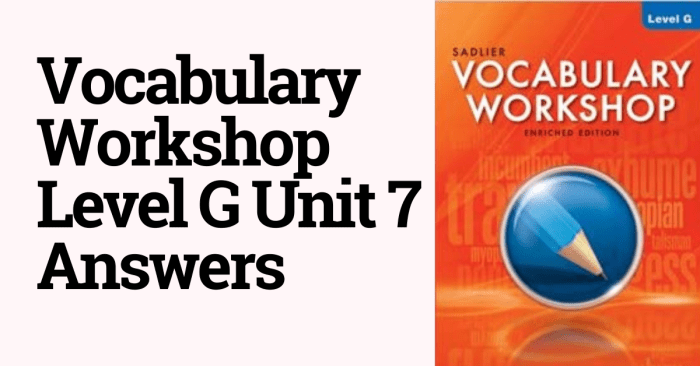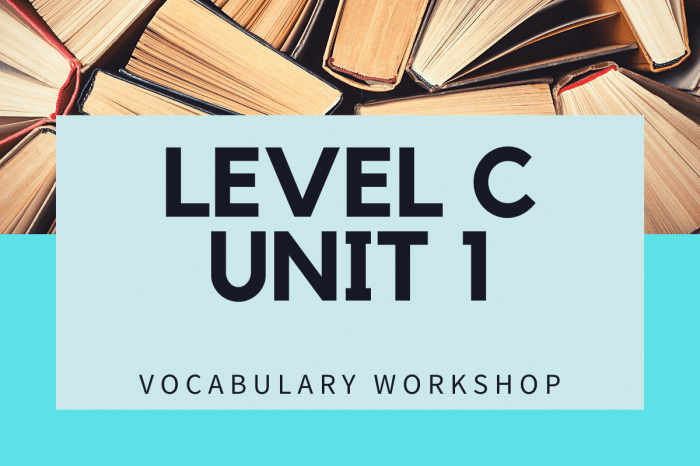Embark on an enriching linguistic journey with Vocabulary Workshop Unit 2 Answers Level D, a comprehensive resource meticulously crafted to empower you with effective vocabulary acquisition strategies, engaging practice exercises, and innovative assessment techniques.
Delve into the intricacies of vocabulary concepts, explore proven strategies for word retention, and engage in interactive exercises designed to solidify your understanding. This guide serves as an indispensable companion for educators and learners alike, fostering a love for language and unlocking the doors to effective communication.
Vocabulary Concepts and Definitions: Vocabulary Workshop Unit 2 Answers Level D

Unit 2 Level D introduces a range of key vocabulary concepts that are essential for effective communication in English. These concepts include:
- Synonyms:Words with the same or similar meaning.
- Antonyms:Words with opposite meanings.
- Homonyms:Words that are spelled or pronounced the same but have different meanings.
- Homographs:Words that are spelled the same but have different meanings and pronunciations.
- Figurative language:Language that uses words or phrases in a non-literal sense to create a vivid or imaginative effect.
Vocabulary Acquisition Strategies, Vocabulary workshop unit 2 answers level d
Acquiring new vocabulary is a crucial aspect of language learning. Effective strategies for vocabulary acquisition include:
- Spaced repetition:Reviewing words at increasing intervals to improve retention.
- Active recall:Trying to remember words without looking at them.
- Contextual learning:Encountering words in meaningful contexts to enhance understanding.
- Visual aids:Using images, diagrams, or flashcards to associate words with visual cues.
- Word games:Engaging in games that focus on vocabulary, such as crossword puzzles or word searches.
Vocabulary Practice Exercises
Interactive exercises are an effective way to practice and reinforce vocabulary. Exercises for Unit 2 Level D include:
- Synonym and antonym matching:Matching words with their synonyms or antonyms.
- Homonym and homograph identification:Identifying words that are homonyms or homographs.
- Figurative language interpretation:Interpreting and explaining the meaning of figurative language.
- Sentence completion:Completing sentences using appropriate vocabulary words.
- Short answer questions:Answering questions about vocabulary words and their meanings.
Vocabulary Games and Activities
Engaging games and activities can make vocabulary learning fun and memorable. Games for Unit 2 Level D include:
- Vocabulary charades:Acting out vocabulary words for others to guess.
- Word association:Saying the first word that comes to mind when given a vocabulary word.
- Vocabulary bingo:Playing bingo with vocabulary words.
- Vocabulary Pictionary:Drawing pictures to represent vocabulary words.
- Vocabulary relay races:Dividing students into teams and having them race to complete vocabulary-related tasks.
Vocabulary Assessment
Assessing vocabulary knowledge is essential to track progress and identify areas for improvement. Methods for assessing vocabulary from Unit 2 Level D include:
- Vocabulary tests:Written or oral tests that require students to demonstrate their understanding of vocabulary words.
- Cloze tests:Filling in blanks in a text with appropriate vocabulary words.
- Vocabulary portfolios:Collections of student work that demonstrate their vocabulary knowledge, such as essays, poems, or presentations.
- Oral presentations:Requiring students to give presentations using vocabulary from Unit 2 Level D.
Vocabulary Integration
Integrating vocabulary learning into other subject areas can reinforce understanding and make learning more meaningful. Cross-curricular activities for Unit 2 Level D include:
- Science:Using vocabulary related to scientific concepts in science lessons.
- Math:Incorporating vocabulary related to mathematical operations and concepts in math lessons.
- Social studies:Exploring vocabulary related to historical events and social issues in social studies lessons.
- Art:Using vocabulary related to art techniques and styles in art lessons.
- Music:Incorporating vocabulary related to musical instruments and genres in music lessons.
Technology Tools for Vocabulary Learning
Technology tools can enhance vocabulary learning by providing interactive and engaging resources. Tools for Unit 2 Level D include:
- Online dictionaries:Providing quick access to definitions, pronunciations, and example sentences.
- Vocabulary apps:Offering interactive games, quizzes, and personalized learning plans.
- Digital flashcards:Allowing students to create and review vocabulary flashcards on their devices.
- Language learning software:Providing comprehensive vocabulary lessons and exercises.
- Online games:Engaging students in vocabulary-based games and activities.
FAQ Summary
What is the purpose of Vocabulary Workshop Unit 2 Answers Level D?
Vocabulary Workshop Unit 2 Answers Level D provides a comprehensive set of resources to enhance vocabulary acquisition, practice, assessment, and integration.
What types of vocabulary concepts are covered in Unit 2 Level D?
Unit 2 Level D covers a range of vocabulary concepts, including synonyms, antonyms, homonyms, and multiple-meaning words.
How can I effectively acquire new vocabulary?
Effective vocabulary acquisition strategies include spaced repetition, active recall, and contextual learning.

